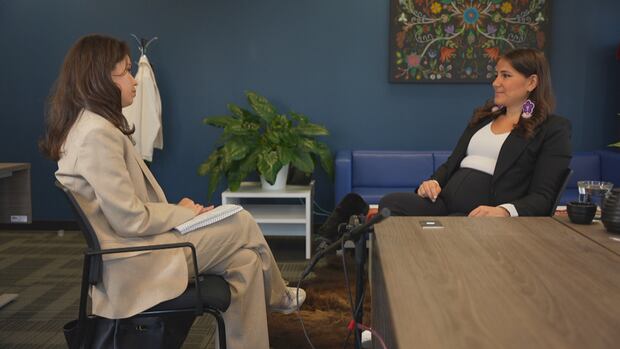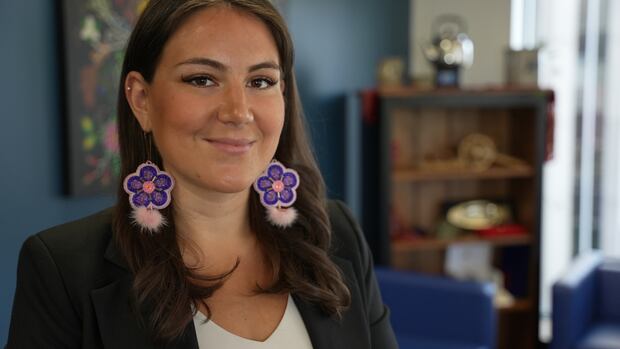Outgoing Métis National Council president says she faced 'misogyny and ageism' in the role
At 29, Cassidy Caron became the youngest person ever to lead the MNC
In three days, Cassidy Caron will leave her role as president of the Métis National Council on the eve of the National Day for Truth and Reconciliation.
Caron told CBC News the decision to step away was a difficult one. The job has taken her on journeys she never imagined. In 2022, Caron led a delegation of Métis residential school survivors to the Vatican to press for a papal apology. She represented the Métis Nation at the funeral for Queen Elizabeth II and attended the coronation of King Charles.

But the role also came with many challenges, she said, including internal political turmoil and leadership obstacles stemming from her youth and gender.
"I absolutely have faced misogyny and ageism throughout the three years that I served in this term," she said. "From both the Métis community, the Métis Nation itself … but also within the federal system as well.
"There is a sense that as a young woman, I don't have the experience to do this work."
Caron said she brought a new generational perspective to the table and built a strong team around her that launched reforms at the Métis National Council (MNC).
In the fall of 2021, at age 29, Caron became the youngest person ever elected to lead the MNC.
Now 32, with a baby on the way, Caron said she needs to spend more time with her family.
Even though she is leaving the MNC, she said she believes a united national Métis voice is needed more than ever.
"We're stronger when we can add more voices to the table, more diverse voices to the table and shape the future based on what our citizens want," Caron said.
Caron, who chose not to seek another term, said the Métis Nation needs the MNC as a national voice, now that the reconciliation project appears to be slipping off the federal government's radar.
"That agenda has kind of remained stagnant," she said.
"We need to take a step back, work together with the federal government, with all parties, to understand what are the priorities of the Métis Nation moving forward. How do we work that into the federal priorities?"
Caron faced constant internal political unrest throughout her term.
The Manitoba Métis Federation pulled out of the MNC one day before she was elected and the Métis Nation-Saskatchewan also recently decided to quit the organization.
The political splits hit close to home for Caron, whose grandmother and grandfather come from the historic Métis communities of Batoche and St. Louis in Saskatchewan.
"It is disheartening to see the separation that is happening across the Metis Nation," she said.
Caron said the MNC cannot remain stagnant. It must reform and continue to have a presence in the nation's capital.
"If we leave Ottawa, we will be forgotten about," she said.
"It's important for us as an advocacy body, a lobby body, to make sure that these priorities are advanced for our communities, for our citizens."
Caron said the MNC would always welcome Manitoba and Saskatchewan back.
"We're all related. We need to be working together," she said.
"There's always going to be issues that we need to come together on that we can't solve province by province, and so that greater responsibility to nationhood, I think, needs to rise to the top."

Caron is also leaving behind unfinished business with the Catholic Church following her trip to the Vatican to hear Pope Francis' apology for the church's role in residential schools.
Caron said she pressed the Canadian Conference of Catholic Bishops to agree to yearly national summits to discuss the relationship between the church and Indigenous communities. She said the conference has not responded to the proposal presented by Indigenous leaders.
"I've been extremely disappointed in the lack of ongoing commitment from the Catholic Church to the reconciliation process," she said.
But Caron said she was able to build bridges with other national Indigenous organizations.
Natan Obed, president of the Inuit Tapiriit Kanatami, said Caron's leadership strengthened relations between the Métis Nation and Inuit.
"I've really been thankful for Cassidy and her leadership," Obed said. "It's going to be tough to fill her shoes."
Caron shared her departing message to the Métis Nation: don't forget who you are.
"We are proud to be Metis people," Caron said. "Take the space that you need to have your voice heard, to influence the change that needs to be made and build a strong support network around you."
Caron isn't ruling out a return to politics someday, even as an MP or senator. For the time being, she said, she needs to take a step back.
"I have always said that I wanted to be a mother before I wanted to be the Métis National Council president," she said.
"I'll focus on motherhood for some time, but I certainly hope to remain connected in one way or another."




